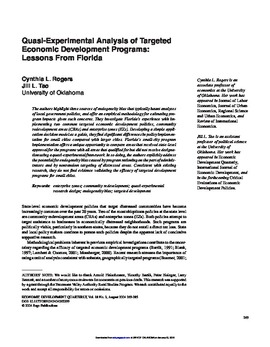Quasi-Experimental Analysis of Targeted Economic Development Programs: Lessons from Florida

View/
Date
2004-08-01Author
Cynthia L. Rogers
Jill L. Tao
Metadata
Show full item recordSee DOI for License
Abstract
The authors highlight three sources of endogeneity bias that typically haunt analyses of local government policies, and offer an empirical methodology for estimating program impacts given such concerns. They investigate Florida’s experience with implementing two common targeted economic development policies, community redevelopment areas (CRAs) and enterprise zones (EZs). Developing a simple application decision model as a guide, they find significant differences in policy implementation for small cities compared with larger cities. Florida’s small-city program implementation offers a unique opportunity to compare areas that received state-level approval for the programs with all areas that qualified for but did not receive designation using a quasi-experimental framework. In so doing, the authors explicitly address the potential for endogeneity bias caused by programrationing on the part of administrators and by nonrandom targeting of distressed areas. Consistent with existing research, they do not find evidence validating the efficacy of targeted development programs for small cities.
Citation
Rogers, C. L., & Tao, J. L. (2004). Quasi-Experimental Analysis of Targeted Economic Development Programs: Lessons from Florida. Economic Development Quarterly, 18(3), 269-285. doi: 10.1177/0891242404265399